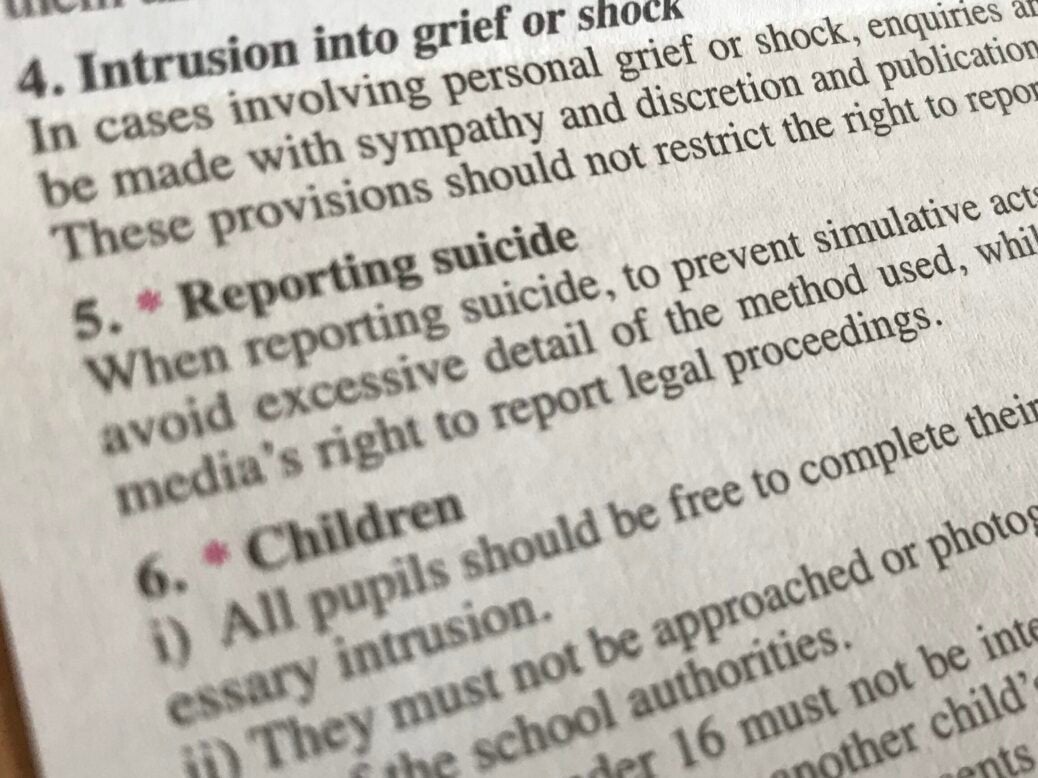
An academic has urged journalism professors to improve how they teach responsible suicide reporting after a survey found nearly three-quarters of students claimed the subject had not yet been brought up during their studies.
Bournemouth University’s Dr Ann Luce, who has co-authored a new model for reporting on suicide, said failures to teach students about suicide reporting guidelines was “not fair” on them or those bereaved by suicide.
Luce described the results of the survey of 229 UK and Ireland journalism students as “slightly alarming”.
The survey, which Luce carried out with Dr Sallyanne Duncan from the University of Strathclyde, quizzed students at various points of study, from first year undergraduates to third years and those on MA courses.
It found that 73 per cent had not yet been taught about suicide reporting guidelines during their studies, even though 86 per cent thought knowing how to report on suicide would be relevant to their future career.
It also discovered that less than half (45 per cent) knew about the Independent Press Standards Organisation’s suicide reporting guidelines.
Just 42 per cent said they had knowledge of similar codes published by the National Union of Journalists or Ofcom, and 38 per cent knew about the ones within the BBC’s editorial guidelines.
Sharing the results of the as yet unpublished survey with Press Gazette, Luce also said a little more than a third (36 per cent) were aware of the suicide reporting guidelines drawn up by the Samaritans charity.
Luce told Press Gazette the results of the survey meant some young journalists were “trying to figure out how to report on a suicide… when they’re in the field and the stakes are really, really high”.
She added: “It’s not fair to them, but it’s also not fair to those who have been bereaved by suicide.
“It’s not fair to the editors. It’s not fair to the news organisation or their colleagues. It’s a problem.”
The former Florida Times-Union journalist claimed the survey was not carried out at every university with a journalism course because some were “afraid if they talk about suicide, they could either cause their students to kill themselves, or it’s just a really uncomfortable topic and they don’t know how to talk about it”.
“We thought if we sent this off to journalism programmes that journalism educators would think ‘yeah we’ll send out this survey, we talk about it, we teach it’… but it actually proved to be a problem,” she added.
Luce went on to say that journalism educators “most definitely” needed to improve their teaching on suicide reporting guidelines.
She is now creating a toolkit alongside Duncan with resources on how to teach reporting on suicide in a responsible way.
The pair will present the findings of their survey and their new Responsible Suicide Reporting Model paper at the International Association of Suicide Prevention World Congress in Derry, Northern Ireland next week.
Luce also shared the new responsible suicide reporting model with Press Gazette, saying it “mapped on all the various different guidelines that exist that UK and Irish journalists could be using and then came up with the standard of moderation you could test for ethics in your story”.
The model contains six ethical questions journalists can refer to while reporting on suicide:
- Have I minimised harm to those affected by suicide?
- Have I told the truth yet avoided explicit details of method and location?
- Have I taken care in producing the story including tone and language?
- Have I used social media responsibly?
- Do I avoid stereotypes, harmful content and stigmatising stories?
- Have I provided support via helplines?
Luce, who edited a book on ethical reporting released this year, said she hoped the questions could later be printed on cards and carried around by journalists in the same way some refer to IPSO’s Editors’ Code of Practice.
Picture: Press Gazette
Email pged@pressgazette.co.uk to point out mistakes, provide story tips or send in a letter for publication on our "Letters Page" blog
